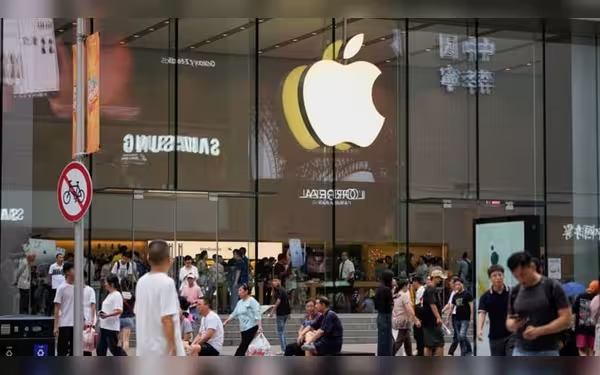Friday, October 4, 2024 06:21 AM
Apple's Declining Market Share in China Amidst Competition
- Apple falls to sixth place in China's smartphone market.
- iPhone 16 launch fails to excite consumers and investors.
- AI technology may help Apple regain market interest.
 Image Credits: channelnewsasia
Image Credits: channelnewsasiaApple's market share in China declines as competition rises, with the iPhone 16 failing to impress consumers and investors.
In recent years, the relationship between Apple and China has been a shining example of how two entities can thrive together. China has long been a goldmine for Apple, boasting a massive consumer base eager to spend on the latest gadgets. On the flip side, China possesses the manufacturing capabilities necessary to meet Apple’s demanding supply chain needs. This partnership has fueled the ambitions of both Steve Jobs and Tim Cook, allowing Apple to dominate the global market. However, as we approach mid-2024, it appears that Apple’s stronghold in the world’s second-largest economy is beginning to weaken.
As of now, Apple has fallen out of the top five smartphone vendors in China, now holding a mere 14 percent market share, which places it at number six. The companies that have surpassed Apple include Vivo, Oppo, Honor, Xiaomi, and notably, Huawei. While it may be easy to point fingers at geopolitical tensions for this decline, the reality is more complex. The notion that Chinese consumers are simply choosing domestic products out of national pride is an oversimplification. The real issue lies in Apple’s lackluster product offerings in the Chinese market.
Once, the launch of a new iPhone was a grand event, drawing enthusiastic crowds in cities like New York and Shanghai. However, the iPhone 16 event in 2024 felt more like a tired tune on repeat, offering only minor upgrades such as a slightly faster A18 chip, larger screens with thinner bezels, and a new camera control button. While these enhancements are technically impressive, they lack the groundbreaking innovation that once captivated consumers.
The reaction from investors reflects this consumer indifference. Following reports of lower-than-expected pre-orders for the iPhone 16 Pro and Pro Max, Apple’s shares dipped by 3 percent. In a move that suggests Apple anticipated this weak demand, the company has already reduced prices for the iPhone 16 in markets like Australia and India.
Despite these challenges, there is still hope for Apple. If the incremental hardware improvements are no longer enough to entice consumers to spend top dollar, the potential of artificial intelligence (AI) could provide a much-needed boost. As technology continues to evolve, AI may offer new features and experiences that could reignite consumer interest and restore Apple’s standing in the market.
While Apple faces significant hurdles in China, it is essential to recognize that the company’s future is not entirely bleak. By embracing innovation and leveraging emerging technologies like AI, Apple has the opportunity to reclaim its position in a market that has been so vital to its success. The road ahead may be challenging, but with the right strategies, Apple can still thrive in the ever-competitive landscape of the smartphone industry.













